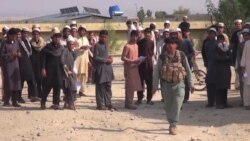Two former Islamic State (IS) commanders who defected recently to authorities in Afghanistan told VOA’s Ashna TV that they joined the extremist group not because of ideology but largely for money.
The revelations underline a discrepancy between those who join IS in Syria and Iraq and the fighters in Afghanistan, analysts say. It underscores too, they add, that IS is a complex phenomenon and operates differently from region to region.
The two men, former Taliban, said they had no contacts with IS in Syria and do not back the IS idea of spreading a caliphate throughout the world.
“I was in the mountains. There was poverty; we were helpless and living with our guns,” Arabistan, one of the commanders told VOA. “There was no work. They [IS] started paying us a monthly salary of 10,000 [Pakistani rupees or approximately $100]. So we joined them.”
VOA could not independently verify the accounts of Arabistan and former fellow commander Zaitoon. The men were interviewed in a comfortable compound provided by Afghan intelligence. Afghan officials and tribal sources confirmed to VOA that men worked with IS.
WATCH: IS Seeks to Expand Safe Haven in Eastern Afghanistan
IS, intolerable
Arabistan, 50, who like many rural Afghans used a single name, says he never went to school and has nine children. He said IS lured him and others into its ranks by offering them money.
Zaitoon, who also used a single name, says he is about 40-years-old and is uneducated. He has eight children and spent 15 years in the mountains before joining IS.
But after 10 months of working for IS, the two commanders said they could no longer tolerate IS ways and negotiated with tribal elders to gain safe haven under the Afghan government.
Zaitoon said: “When we joined, they said they will bring Sharia [Islamic law]. But they looted people, chopped off heads, put bombs on people. We could not tolerate this and decided to come back to our own people and country.
“They asked us to fight and kill members of the Afghan National Army, tribal elders, and those who have influence in the community,” he said.
There are an estimated 2,000 to 3,000 IS militants in Afghanistan, according to intelligence reports.
WATCH: How Islamic State Got a Foothold in Eastern Afghanistan
Forcing people to join
In recent months, there has been an increase in IS violence in Afghanistan, especially in Nangarhar province, where fighters have launched multiple attacks on Afghan security checkpoints.
In Afghanistan, IS runs cross-border smuggling operations of people, money and even timber, according to reports. IS has also advertised on its media sites how it trains foreign recruits in Afghanistan.
Zaitoon told VOA that the militant group provided training to new recruits, many of them coming from Pakistan.
In some cases, IS is forcing local people in areas it controls into joining its ranks.
“Daesh [IS] says whoever is not with them, they are spies, so people have to join or leave that place,” Arabistan said.
“We didn’t like their treatment of tribal elders. We told them not to harm tribal elders and the old, but they said, you have nothing to do with how we deal with everyone. They were not sparing those who had some influence."
Joining the fight against IS
Analysts say the IS group in Afghanistan is not necessarily linked with Syria and Iraq. The former IS commanders told VOA that they had no connections to Syria and to Iraq and had not met any Syrians or Iraqis during the course of working for IS.
“No, I have not seen these people with our own eyes. Those who have contacts they may have, but I have not seen them with our eyes,” Zaitoon said, when asked if he had been in touch Syrians or Iraqis.
Commenting on the video, Rebecca Zimmerman, an analyst at Rand Corp. in Washington on Afghan affairs, said the interviews provide more insight into how IS operates in Afghanistan.
IS “is still a comparatively new phenomenon in Afghanistan,” she said. “[We] are trying to understand who are these people, why are they fighting.
“These fighters do not appear to be motivated by the radical dream of the caliphate in the same way we have seen a lot of fighters for [IS] globally,” she said. “They do not appear to be as radical in their ideology. They seem much more locally motivated.”
For his part, ex-commander Arabistan says he is now ready to join the fight against IS in Afghanistan.
“Now we will be fighting for our own land and protect our country,” he said.
A VOA correspondent in Kabul contributed to this report.







